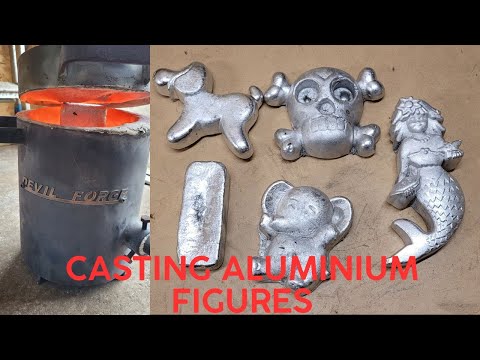Stahl Specialty Company - An Overview
Stahl Specialty Company - An Overview
Blog Article
Stahl Specialty Company for Dummies
Table of ContentsThe Ultimate Guide To Stahl Specialty CompanyGetting The Stahl Specialty Company To WorkFascination About Stahl Specialty CompanyStahl Specialty Company Can Be Fun For EveryoneStahl Specialty Company Things To Know Before You Get This
Chemical Contrast of Cast Aluminum Alloys Silicon advertises castability by lowering the alloy's melting temperature and enhancing fluidity during spreading. Additionally, silicon adds to the alloy's strength and wear resistance, making it beneficial in applications where resilience is essential, such as automobile components and engine parts.It also enhances the machinability of the alloy, making it much easier to refine into ended up products. In this means, iron adds to the general workability of aluminum alloys. Copper boosts electrical conductivity, making it beneficial in electrical applications. It additionally improves corrosion resistance and contributes to the alloy's overall strength.
Manganese adds to the stamina of light weight aluminum alloys and enhances workability. It is frequently used in functioned light weight aluminum items like sheets, extrusions, and profiles. The visibility of manganese aids in the alloy's formability and resistance to breaking during fabrication processes. Magnesium is a light-weight element that supplies stamina and impact resistance to light weight aluminum alloys.
It enables the production of lightweight parts with exceptional mechanical buildings. Zinc enhances the castability of light weight aluminum alloys and assists control the solidification procedure throughout casting. It enhances the alloy's stamina and solidity. It is frequently discovered in applications where elaborate forms and fine details are needed, such as attractive spreadings and particular automotive components.
The Stahl Specialty Company Diaries
Because aluminum-silicon alloys have great spreading residential or commercial properties, high gas residential or commercial properties, easy procedures, and exceptional deterioration resistance, aluminum-silicon alloys are most generally utilized in the die-casting industry in your home and abroad. At the exact same time, aluminum-silicon alloys are likewise fairly very early and commonly acknowledged alloys created and utilized in die-casting. After continual research study and enhancement, most of the current global mainstream aluminum-silicon alloys have been completed and are absolutely nothing greater than A356, A360, A380, ADC12, B390, and A413.
The key thermal conductivity, tensile strength, return stamina, and prolongation vary. Select appropriate raw materials according to the performance of the target product created. Amongst the above alloys, A356 has the highest possible thermal conductivity, and A380 and ADC12 have the least expensive. The tensile limitation is the contrary. A360 has the most effective yield stamina and the highest elongation rate.

A Biased View of Stahl Specialty Company
In accuracy casting, 6063 is well-suited for applications where complex geometries and high-grade surface finishes are extremely important. Examples consist of telecommunication rooms, where the alloy's premium formability enables smooth and cosmetically pleasing layouts while maintaining structural honesty. Likewise, in the Lights Solutions market, precision-cast 6063 elements develop sophisticated and reliable illumination components that require elaborate shapes and great thermal efficiency.
(https://sitereport.netcraft.com/?url=https://stahlspecialty.com)
The A360 shows remarkable prolongation, making it optimal for complex and thin-walled parts. In precision spreading applications, A360 is well-suited for industries such as Customer Electronic Devices, Telecommunication, and Power Devices.

In precision casting, light weight aluminum 413 shines in the Customer Electronics and Power Tools sectors. It's typically made use of to craft complex elements like smart device real estates, cam bodies, and power tool coverings. Its accuracy is amazing, with limited tolerances up to 0.01 mm, making sure perfect item setting up. This alloy's premium deterioration resistance makes it an exceptional option for outside applications, making sure lasting, durable products in the discussed sectors.
7 Simple Techniques For Stahl Specialty Company
The light weight aluminum alloy you choose will considerably influence both the spreading process and the properties of the final product. Due to the fact that of this, you need to make your decision carefully and take an informed technique.
Establishing the most ideal aluminum alloy for your application will certainly mean evaluating a large range of characteristics. The initial classification addresses alloy characteristics that impact the manufacturing process.
The alloy you pick for die casting straight impacts numerous elements of the spreading process, like just how simple the alloy is to deal with and if it is susceptible to casting issues. Hot fracturing, additionally known as solidification breaking, is a regular die casting flaw for aluminum alloys that can cause inner or surface-level tears or cracks.
Indicators on Stahl Specialty Company You Should Know
Specific aluminum alloys are much more susceptible to you can check here hot splitting than others, and your choice must consider this. One more common problem found in the die casting of light weight aluminum is die soldering, which is when the cast adheres to the die wall surfaces and makes ejection difficult. It can damage both the cast and the die, so you must look for alloys with high anti-soldering properties.
Deterioration resistance, which is currently a remarkable characteristic of light weight aluminum, can vary substantially from alloy to alloy and is a necessary characteristic to think about depending on the ecological conditions your item will be exposed to. Use resistance is one more home frequently looked for in aluminum products and can set apart some alloys.
Report this page